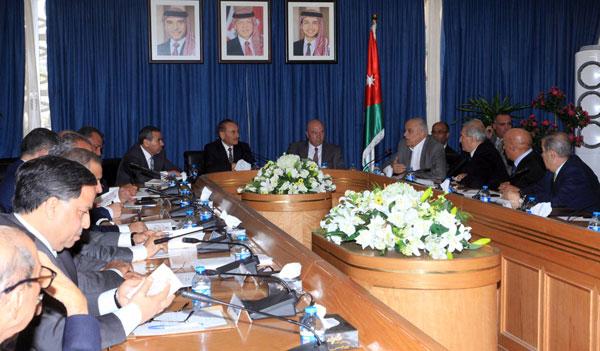You are here
Jordan's political system based on flexible separation of powers — Khawaldeh
By Dana Al Emam - May 04,2016 - Last updated at May 04,2016
AMMAN — Removing the paragraph from Article 75 of the Constitution that bans dual nationality for occupiers of senior public positions does not automatically grant them these posts, said Public Sector Development Minister Khleef Al Khawaldeh.
"The appointment of ministers and senators is governed by articles 44, 64 and 75 of the Constitution, and is based on factors of competence and merit," he told The Jordan Times in a recent interview on the latest constitutional amendments.
Khawaldeh noted that nomination for Lower House seats is also governed by a set of conditions mentioned in the Constitution and the Elections Law, adding that selection is decided first and foremost by voters.
Article 26 of the Constitution, he noted, states that the executive power shall be vested in the King and he shall exercise it through his ministers in accordance with the provisions of the Constitution.
At the same time, the first clause of Article 45 of the Constitution states that the Council of Ministers shall undertake the responsibility of administrating all internal and external affairs of the state, except those entrusted by the Constitution to any other person or body, which according to Khawaldeh clearly exempts the Cabinet from some authorities.
Therefore, he said, the newly added paragraph to Article 40 of the Constitution, which states that the King shall exercise his powers individually and appoint the Crown Prince, the Regent, Senate president and members, and members of the Constitutional Court, president of the Higher Judicial Council, chairman of the army’s Joint Chiefs-of-Staff, and the directors of the general intelligence and gendarmerie departments, did not expand the Monarch's authority, but explained how he practises his powers.
The minister added that the King is the Supreme Commander of the land, naval and air forces and he is the one to declare war, under Article 33 of the Constitution.
Therefore, he is the direct reference of the concerned entities, a matter that logically justifies amending Article 127 of the Constitution, Khawaldeh argued.
"The Monarch's direct appointment of the leaders of military bodies does not render them immune to or exempt from responsibility, as responsibility falls upon the appointee, not the appointer," he said, adding that heads of military bodies have to abide by regulations and are subject to accountability from the concerned administrative and judiciary entities.
The minister added that the King is a partner of the legislative authority, which has a legislative role in endorsing provisions from the Cabinet and drafting new by-laws, as well as a role in overseeing the executive branch of the government.
A detailed reading of the Jordanian Constitution shows that the legislative, executive and judicial authorities run the state based on their responsibilities mentioned in the Constitution, in addition to constitutional institutions, such as the Independent Elections Commission and the Audit Bureau, Khawaldeh said.
"Jordan's political system is based on a flexible separation of the three powers, yet they function in integration."
Furthermore, he noted that Article 30 of the Constitution, which acknowledges the King as the head of state and that he is immune from every liability and responsibility, guarantees "balance" between the three authorities in a way that prevents polarisations against the public interest.
Jordan's current roadmap for reform, according to the minister, necessitates drawing long-term policies that function as "stable constants" to the state and its relations, a matter that allows successive governments to work within a unified framework.
Related Articles
AMMAN — The Lower House on Monday continued deliberations on draft constitutional amendments.During the session, headed by Lower House Speak
AMMAN — The Senate's legal committee on Thursday endorsed the draft constitutional amendments as sent by the Lower House during a meeting ch
AMMAN — The Cabinet on Monday endorsed amendments to five articles of the Constitution, one of which allows dual nationality for occupiers o


















